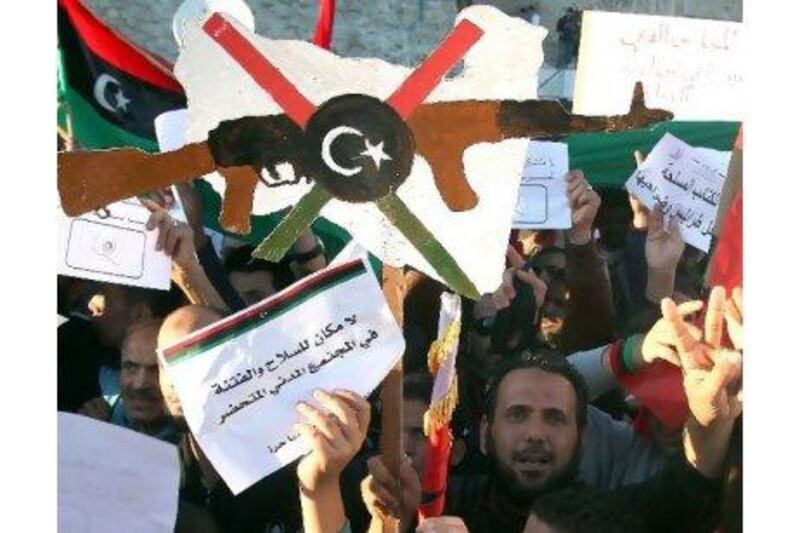TRIPOLI // The capital's Martyrs' Square is the scene of almost nightly celebrations of the killing of Muammar Qaddafi.
Fireworks explode, rebel soldiers take children for rides on their anti-aircraft guns and spin them around like it is an amusement park. Merchants sell revolution trinkets such as key rings and mugs, and comic photo-shopped images of the fallen dictator.
"Thank God, Muammar is dead and there is no more trace of his awful family in this country," yelled one middle-aged man on a recent chilly evening.
That's the kind of celebratory chatter heard all over the square. But among even this crowd, there is a gnawing concern - guns.
Tens of thousands were given to people to fight the civil war. With tribal conflicts and personal score-settling on the rise, these same guns have become Libya's primary security threat. What is more, the problem goes beyond rifles and handguns - Libya is also home to thousands of rocket propelled grenades (RPGs), surface-to-air missiles, landmines and chemical weapons.
Further, since the uprising and civil war, people have become used to carrying weapons.
Teenagers, fathers, and gangs of young men often carry rifles. And then there are the bigger guns. The pickups loaded with anti-aircraft guns that became icons of the Libyan opposition are still ubiquitous, parked in squares or leaving skid marks on roads.
Across town from the party in Martyrs' Square, the Brigade Captain Abed Al Majid heads up one of numerous Tripoli brigades tasked with getting guns out of civilian hands.
Some people, he said, would be willing to give up their bullets and hang on to their guns as mere mementos.
Eventually, these guns too will have to be confiscated but for now, the captain and his men are focused on men who want to keep their guns for political reasons.
"There are those with guns and they keep the bullets and will use them," he said. "But if they do, we will be on to them. We will arrest these people and they will be punished in court."
On a recent night, Capt Al Majid and his men set up a checkpoint on a busy Tripoli thoroughfare to seize illegal guns. Those with government-issued licenses are let go, but those who do not face a different fate.
For now, their weapons are confiscated. The gun licenses were first issued towards the end of the civil war, but mostly in the bigger cities
The criteria were simple: people had to have clean criminal records and be fighting on the side of the rebels.
The initial idea of the licenses was to keep arms from reaching Qaddafi loyalists. Now the system is being used to reduce and regulate the carrying of weapons. For now, however, it has been largely ineffective.
"We have to confiscate those guns and interrogate their owners a little to see where they got them, what they will do with them and why they haven't given them up," said Capt Al Majid of the unlicensed weapons.
There are two main reasons people are not giving up their arms. Some have said that Libya is still too dangerous. Others, mostly former fighters, like Ahmed Suleiman and his friends, have refused to give up their guns as a matter of principle.
They have a personal arsenal in their home neighbourhood of Gorgi. As they clean their guns, mostly AK-47s and handguns, Mr Suleiman explains that they sacrificed much to defeat Qaddafi and so, relinquishing these arms before the new political order is in place, is impossible.
"I won't give them up until the ministry of defence releases an official declaration that everyone must give up their guns," said Mr Suleiman. "But right now, we won't do it."
Libya has recently named a new cabinet but no such declaration has been issued. The only legal pressures are a vague appeal by the National Transitional Council (NTC) to the public to voluntarily give up their guns, as well as the NTC's right to confiscate unlicensed arms.
And then there are the bigger guns. Dotted across the capital are numerous warehouses, run by the NTC, where the scale of the problem is apparent. They house heavy artillery, RPGs, landmines, and even Scud missiles.
Thousands of these kinds of heavy weaponry are thought to be still at large, and it is this that has the international community on edge. It fears Libya's stray military hardware has been smuggled to Al Qaeda in Algeria or to Hamas in the Gaza Strip.
Israel has taken measures to secure its civilian and military air traffic from possible attack from surface-to-air missiles smuggled to Gaza from Libya, according to Reuters. And the United Nations has sent teams to help Libya find and neutralise chemical weaponry left behind by Qaddafi.
While the NTC, together with international partners, works to curb the spread of heavy weaponry, its Tripoli-based subdivision, the Tripoli Revolutionary Council (TRC) has focused on the problem of armed citizens.
"Our staff is going around neighbourhoods, talking about this, educating people regarding guns and the dangers of having guns at home," said Jamal Faraj, who works for the gun-control unit of the TRC. "So it's working. It's working."
Indeed, Mr Faraj and his team collected more than 1,000 arms in a two-week period recently. But there are hundreds of thousand of arms to go, according to NTC estimates.
Meanwhile, back at Capt Al Majid's barracks, there is a party, celebrating a bust, that day, of an arms cache belonging to Qaddafi loyalists, which contained hundreds of machine guns and dozens of RPGs. Men gather around plastic tables and enjoy couscous and chicken, and others dance with joy to the booming sound system.
While Capt Al Majid says he understands the fears driving those who keep guns, he is determined to solve the problem, one bust at a time.





